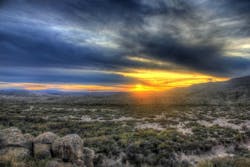Texas Blackouts Impact Drinking Water Systems
Texas blackouts triggered by frozen power infrastructure have left millions of Texans without power, heat and water during a winter storm.
Alongside freezing temperatures and hazardous road conditions throughout the state, there is uncertainty around when these dangerous circumstances will be alleviated.
Officials are asking Texans who still have access to water and natural gas to limit usage of those resources, reported WFAA.
Judge Lina Hidalgo, county judge in Harris County, Texas, shared a video on Twitter about the issues water utilities are facing. She notes that loss of power and burst pipes have reduced water pressure in the drinking water system, resulting in a loss of water for homeowners.
Hidalgo called for the public to stop dripping their faucets to conserve water as well as the water pressure so emergency services — hospitals and fire departments — can still operate effectively. Many Texans are following boil water advisories.
The Texas Division of Emergency Management’s website includes a list of warming centers across the state.
The outages have not only affected households but also some water and wastewater facilities.
One such facility is located in Pearland, Texas. Clarence Wittwer, public works director for the city, shared his experience on Twitter, noting that despite all planning, things still went awry.
“We had fuel. We tested the generators, double checked our supply lines. ERCOT literally just flipped the switch. Zero consideration for hospitals and other facilities in the area, no communications,” Wittwer said in a Tweet, referencing the shedding of power at the direction of the Electric Reliability Council of Texas (ERCOT).
Texas’ power grid operators and ERCOT officials are unable to predict when outages might end. ERCOT is trying to avoid a total blackout by instructing power utility companies to cut power to customers, reported The Dallas Morning News.
“We needed to step in and make sure that we were not going to end up with Texas in a blackout, which could keep folks without power — not just some people without power but everyone in our region without power — for much, much longer than we believe this event is going to last, as long and as difficult as this event is right now,” ERCOT CEO Bill Magness said to The Dallas Morning News.
Wittwer said in his Tweets, that power to the city’s water and sewer facilities had been cut off as part of the power shed. Diesel generators were used to keep the plants running but as they ran out of fuel, a request for more could not be fulfilled. Without power, the fuel supply stations were unable to fill their tankers to provide it. Ultimately, this resulted in thousands of people losing water when the fuel supply for the generators ran out. As of 2 p.m. Central time Feb. 17, Wittwer said some power had returned to the Pearland facilities.
In response to similar problems at water facilities throughout the state, water officials and city mayors have started heavy messaging emphasizing the importance of water conservation for the public during this crisis.
In an interview with The Austin American-Statesman, Austin City Council Member Leslie Pool said the city pushed back against the request from the ERCOT to shed more power. According to local officials, doing so would threaten critical infrastructure such as hospitals and emergency response stations.
Bruce Bullock, director of the Southern Methodist University Maguire Energy Institute, said much of the natural gas available has gone towards Texans' homes, according to a report from WFAA-TV, a local broadcast news station in Dallas.
In the WFFA-TV report, Texas Gov. Greg Abbot said the state's power plants need fuel but are not getting an adequate supply, since natural gas providers are unable to manufacture, ship or transport their product either.
"The Electric Reliability Council of Texas has been anything but reliable over the past 48 hours,” said Abbott in a statement reported by the Austin American-Statesman. “Far too many Texans are without power and heat for their homes as our state faces freezing temperatures and severe winter weather. This is unacceptable."
